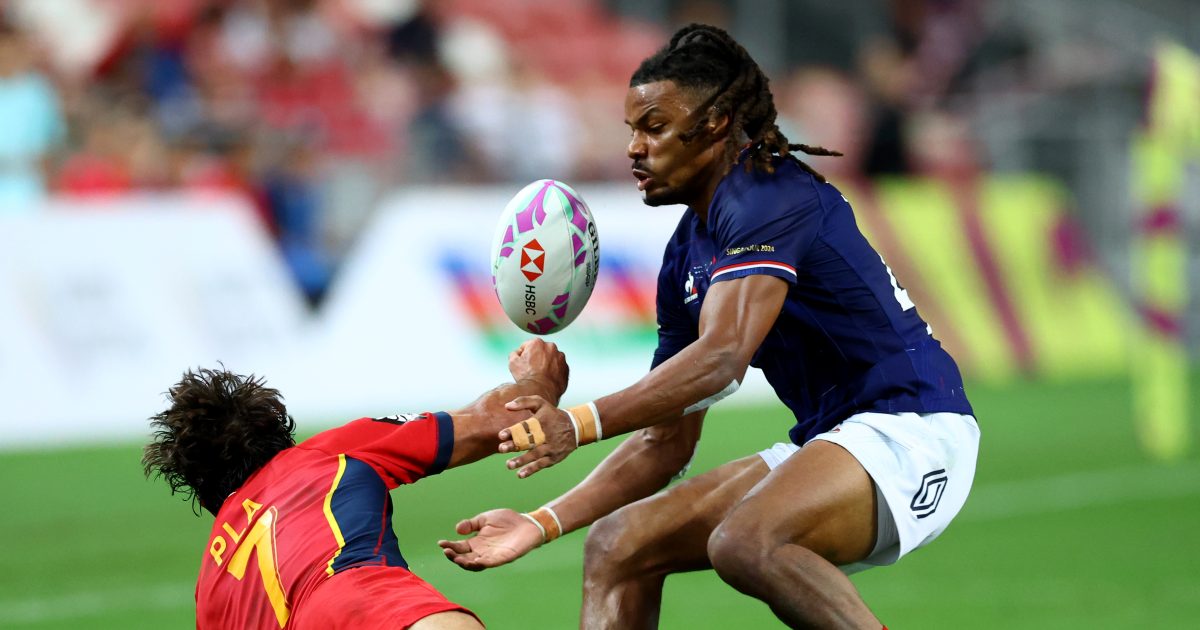France 7 se fait peur mais assure l'essentiel à Singapour

L’Argentine, leader des Series, s’est inclinée face à l’Australie mais a battu la Nouvelle-Zélande de manière convaincante lors de la première journée du HSBC SVNS Singapore, se rapprochant ainsi du titre de vainqueur de la saison.
Si les Pumas Sevens, qui se sont classés 9e lors du tournoi précédent à Hong Kong il y a un mois, parviennent à atteindre au moins les demi-finales de Cup au Singapore National Stadium, ils seront assurés de remporter le trophée. Leur victoire 33-5 contre les All Blacks Sevens lors du dernier match de la première journée a démontré qu’ils étaient de retour à leur meilleur niveau.
Les États-Unis, classés huitièmes, ont pris l’avantage dans la course à la dernière place de la Grande Finale en remportant leurs deux matchs contre les Fidji et l’Irlande, tandis que la Grande-Bretagne, classée neuvième, n’a réussi à obtenir qu’une seule victoire contre les Fidji.
Les États-Unis ont décroché leur place en quarts de finale de Cup, mais leur qualification pour Madrid dépendra de la performance de la Grande-Bretagne ; un affrontement final crucial entre les deux équipes est donc à prévoir demain.
Poule A : l’Australie en tête
L’Australie a débuté en force à Singapour en remportant deux matchs lors de la première journée. Ils ont vaincu l’Argentine, en tête du classement, sur un score de 26 à 19, puis sont remontés au score pour battre le Canada 21 à 14, garantissant ainsi leur place en quarts de finale.
Lors de la première mi-temps contre l’Argentine, les Australiens ont pris l’ascendant en menant 12 à 5 à la pause, avec des essais marqués par James Turner et Ben Dowling. Nathan Lawson et Turner ont ensuite ajouté deux autres essais, mettant ainsi l’Australie à l’abri malgré les tentatives de Matías Osadczuk et Gaston Revol, qui ont réussi à marquer en fin de match.
Après un début difficile, l’Argentine est revenue en force avec une victoire convaincante de 33 à 5 contre la Nouvelle-Zélande. Rodrigo Isgro et German Schulz ont tous deux inscrit des essais pour répondre à l’ouverture du score des All Blacks Sevens, avant que Tomas Elizalde ne creuse l’écart en fin de match pour sceller leur victoire. Ils se mesureront au Canada demain dans l’espoir de progresser davantage vers le titre de champion de la saison.
Dans leur premier match, les Néo-Zélandais étaient en difficulté, traînant derrière le Canada avec un score de 12 à 17, jusqu’à ce qu’un doublé de Kitiona Vai les sauve. Son premier essai a permis à son équipe d’égaliser à la dernière minute, forçant ainsi la prolongation, tandis que son deuxième a marqué le point en or, mettant fin aux espoirs des Canadiens.
Poule B : les Blitzboks invaincus

En tête de la poule B devant la France grâce à une meilleure différence de points, l’Afrique du Sud a pris l’ascendant lors de la première journée avec des victoires sur l’Espagne (31-7) et les Samoa (15-10). Deux essais marqués en seconde période par Selvyn Davies et Shilton Van Wyk contre les Samoa ont couronné une journée fructueuse pour les Blitzboks à Singapour. Ils se préparent maintenant à affronter la France dans le match décisif de la poule B demain.
La France, finaliste à Hongkong, a battu les Samoa 17-0 lors de son premier match et a survécu à une frayeur contre l’Espagne, en revenant de 0-7 à la mi-temps pour s’imposer 17-12.
Rayan Rebbadj a marqué le premier essai pour la France juste après la mi-temps, mais c’est le doublé de Joachim Trouabal et une solide défense en fin de match qui ont assuré la victoire.
« Les Espagnols sont très rapides, ils jouent très bien et on savait qu’on devait résister à chaque fois qu’ils nous attaquaient », commentait Jonathan Laugel à l’issue de la rencontre.
« On a échoué parfois, on aurait dû être plus forts. Il va falloir qu’on change contre l’Afrique du Sud.
« Soyons vigilants, calmes, même si d’autres équipes nous mettent la pression, restons calmes. On sait comment gérer ce genre de situation. »
Avec un point bonus défensif chacun, les Samoa et l’Espagne s’affronteront demain pour une éventuelle place en quart de finale.
Poule C : les Etats-Unis prennent le contrôle
Les États-Unis ont entamé leur parcours à Singapour en remportant leurs deux matchs lors de la première journée. Ils ont d’abord battu les Fidji sur un score de 33 à 14, puis ont vaincu l’Irlande dans un match tendu avec un score de 10 à 7.
À la mi-temps, l’Irlande menait 7 à 0, mais Perry Baker et Kevon Williams ont renversé la situation en seconde période pour les États-Unis. Malgré une ultime tentative de poussée de l’équipe irlandaise, les États-Unis ont tenu bon pour se qualifier pour les quarts de finale à Singapour, prenant ainsi une option vers la Grande Finale.
Bien que la Grande-Bretagne se soit inclinée 19 à 5 contre l’Irlande, elle a montré une performance impressionnante lors de sa victoire 19 à 14 contre les Fidji. En prenant une avance de 12 à 0 grâce aux essais de Kaleem Barreto et Robbie Ferguson, la Grande-Bretagne a maintenu son avance malgré les tentatives des Fidji de remonter. L’essai de Tom Emery en seconde période a assuré leur victoire.
Les Fidji, qui ont remporté le tournoi à Singapour à trois reprises, sont à sec cette fois-ci. Cependant, leur point de bonus défensif contre le Royaume-Uni leur donne une lueur d’espoir pour la qualification en quarts de finale de la Cup s’ils parviennent à battre l’Irlande demain.


